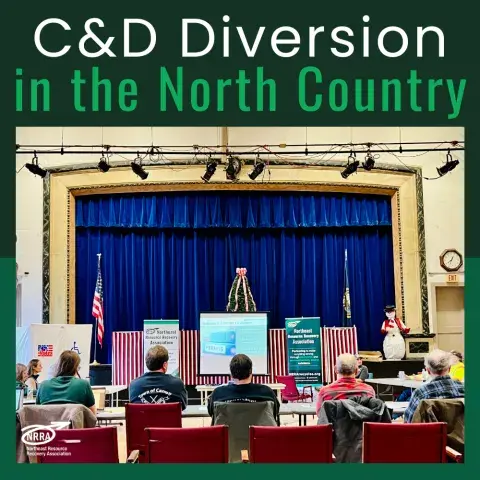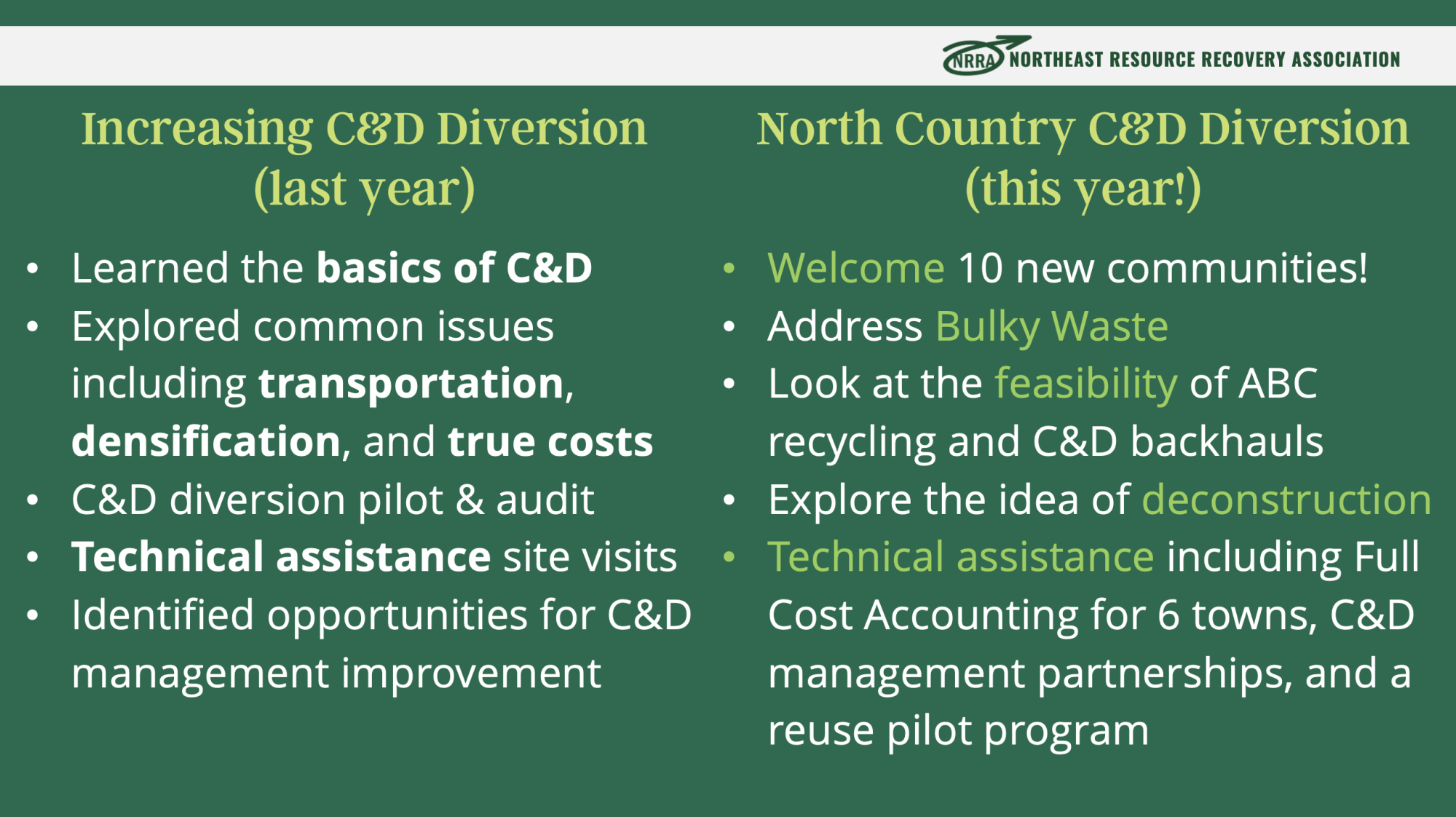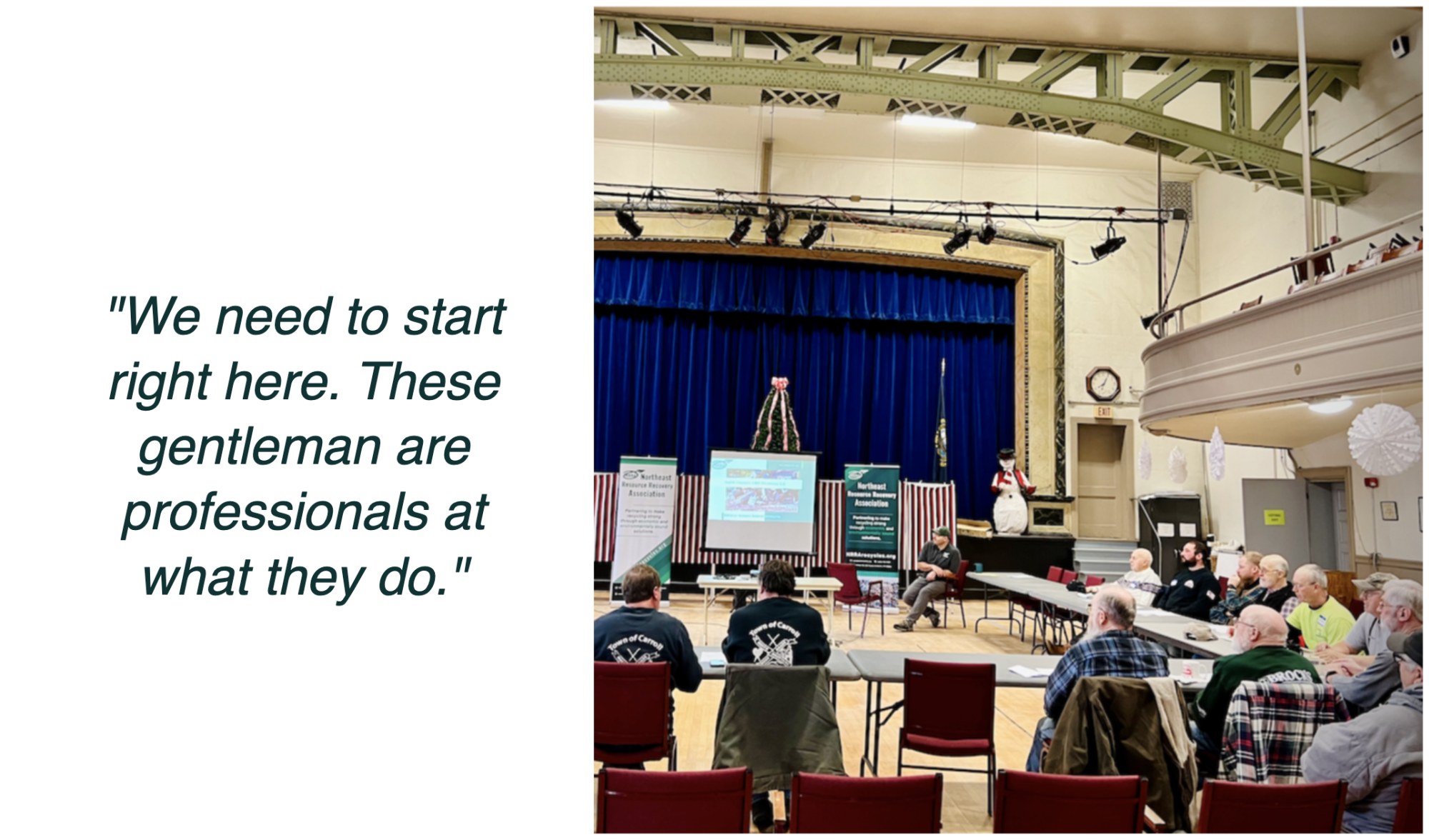
Last year, NRRA began these conversations about C&D Diversion with Coös County facilities. This year, we are excited to move forward and focus on new topics related to C&D diversion, including bulky waste diversion and reuse; asphalt, brick, and concrete (ABC) recycling; and the idea of deconstruction - plus lots more technical assistance opportunities.
At our first North Country C&D Diversion 2.0 Summit, we welcomed 10 new communities into the fold. Member Services Manager, Brian Patnoe, gave a brief overview of how this year's work differs from last, including two new feasibility studies looking into ABC crushing and C&D recycling backhauls, addressing bulky waste, exploring the idea of deconstruction, and several technical assistance opportunities.

The best part of the C&D Summit, as always, were the lively and engaging conversations! Operators raised several major concerns related to managing C&D in the North Country. The group also discussed bulky waste and infrastructure needs. Finally, we closed with next steps and ways in which North Country communities and facilities can work together to bring all of the C&D Stakeholders to the table.
Major Concerns Raised:
There is only one asbestos inspector in the North Country. Further, many facilities don't receive any kind of asbestos or lead reports, and most home owners are unaware there should be a report to begin with! This poses a huge safety concern for operators managing the C&D. Many feel that above the notches is the "wild wild west" when it comes to building and demolition.
Possible solutions include adding asbestos and lead report notifications on building permit applications and training town building inspectors to also become lead and asbestos inspectors.
The solid waste management profession deserves to be elevated. Operators on a whole are aging out, with fewer young operators coming into the profession. Some believe there is a need to professionalize the industry in order to achieve meaningful change. Operating a transfer station requires a wide skillset - there is a lot asked of operators, yet they are routinely undervalued and underpaid.

Bulky Waste & Infrastructure Needs:
Bulky Waste is often more difficult to handle than C&D. While bulky waste is a lot of air, it takes up lots of space. There are concerns of illegal dumping and growing difficulty with managing mattresses in particular. Often operators are seeing C&D cans filled with #5 plastics, random household items, and heaps of rigid plastic.
Possible solutions include a ReSTORE north of the notches and online options akin to the "Front Porch Forum" in Vermont (somewhat similar to Facebook Marketplace). While some solutions will work, not every community needs the same thing. There is a need to think regionally, with towns helping towns. A pilot program could be an option to answer some of the questions about the feasibility of C&D recycling in the North Country (such as, is there enough C&D for local C&D recycling infrastructure to make sense?!)
Next Steps:
We plan to bring in presenters on both deconstruction and on the ReSTORE model at our next meeting. We will also be presenting findings from both of our feasibility studies and next steps based on those results. We will also be talking as a group about the impact of the changing landfill and potential incinerator landscape in the North Country. Once we have our presenters confirmed, we will be reaching out to our North Country partners for help inviting local contractors, select board members, and others our North Country operators feel would be important to have at the table as we talk through solutions and next steps!
Resources:
- Asbestos: What Homeowners, Contractors, Property Managers and Landlords Need to Know - NH Department of Environmental Services
Information and resources regarding the licensing of Lead Abatement Professionals - NH Department of Health and Human Services
This project has been funded wholly or in part by the United States Environmental Protection Agency under assistance agreement HC-00A01372 to Northeast Resource Recovery Association. The contents of this document do not necessarily reflect the views and policies of the EPA.
Northeast Resource Recovery Association complies with applicable Federal civil rights laws and does not discriminate on the basis of race, color, national origin, age, disability, or sex (including pregnancy, sexual orientation, and gender identity).
